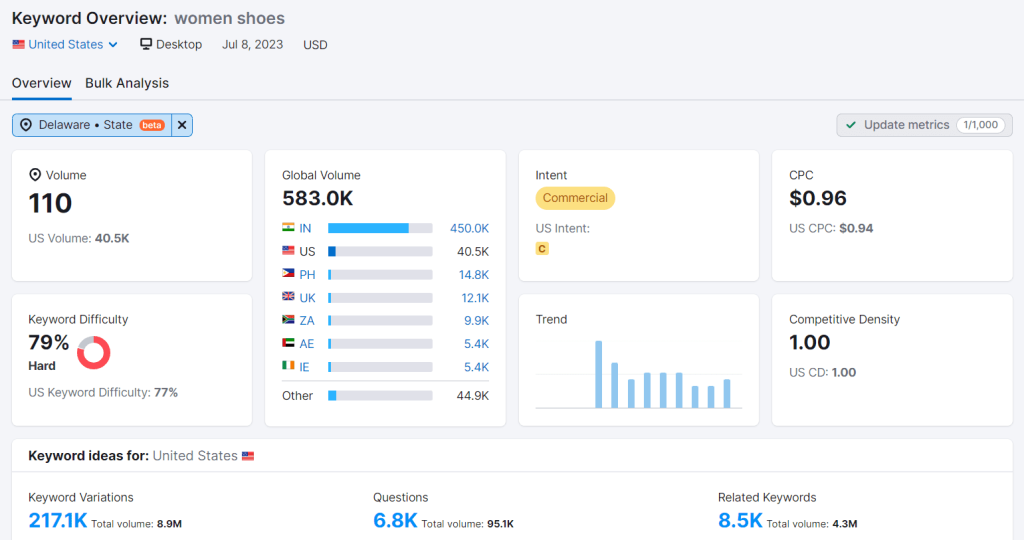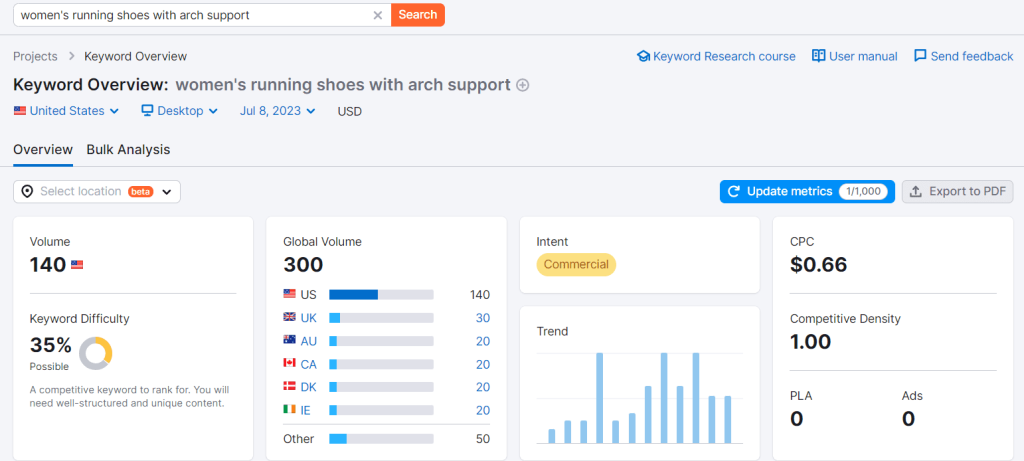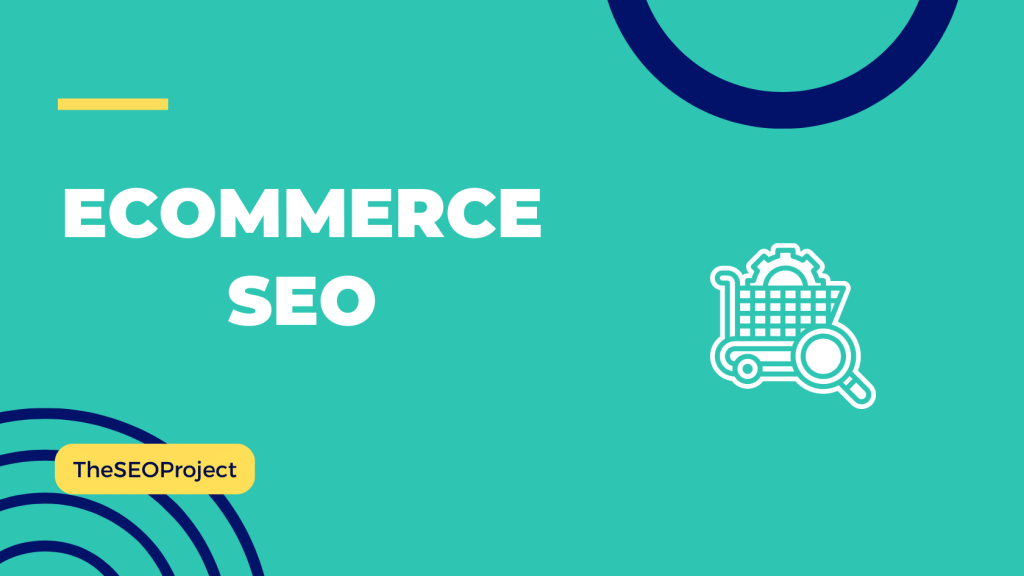If you’re running an Ecommerce website, you already know how important it is to optimize it for search engines. However, Ecommerce SEO can be a complex practice, and it can take a significant amount of time to show results.
With the ever-growing competition in the eCommerce industry, it’s crucial to implement effective SEO techniques to stand out from the crowd. Whether you’re a small business owner or a seasoned eCommerce professional, having knowledge of SEO for eCommerce can ensure long-term success for your online store.
But fear not, as I have simplified it into five key areas that you need to focus on. By the end of this comprehensive guide, you’ll have a clear understanding of what to do and how to do it without any guesswork or frustration. Just results.
Why is SEO Essential for Ecommerce?
SEO helps eCommerce websites to get higher visibility in search engine results pages (SERPs), which drives more traffic to the website and increases sales. Here are some reasons why SEO is essential for eCommerce:
Increased Visibility and Traffic
SEO helps eCommerce websites to rank higher in SERPs, which increases their visibility and drives more traffic to the website. When a user searches for a product or service that the eCommerce website offers, a higher ranking in SERPs can make a significant difference in the amount of traffic the website receives.
Better User Experience
SEO helps to improve the user experience of an eCommerce website. When a website is optimized for SEO, it becomes more user-friendly and easier to navigate. This makes it easier for users to find what they are looking for and increases the chances of them making a purchase.
Improved Credibility
When an eCommerce website appears higher in SERPs, it can also improve its credibility. Users are more likely to trust websites that appear at the top of search engine results pages, which can lead to more sales and revenue for the eCommerce business.
Cost-Effective Marketing
SEO is a cost-effective way to market an eCommerce business. Unlike traditional marketing methods, such as print or television advertising, SEO can be done at a relatively low cost. This makes it an attractive option for small and medium-sized eCommerce businesses that may not have a large marketing budget.
Increased Sales and Revenue
Ultimately, the main reason why SEO is essential for eCommerce is that it can lead to increased sales and revenue. When an eCommerce website appears higher in SERPs and receives more traffic, it has a higher chance of converting that traffic into sales. This can lead to significant revenue growth for the eCommerce business.
5-Step Ecommerce SEO Guide
Here’s the ultimate guide for your eCommerce SEO. I have been using Semrush as my main SEO tool, and I have been getting significant results for years. So, I will be using Semrush as an example.
Step 1. Ecommerce Keyword Research
One of the primary steps in eCommerce SEO is conducting a detailed keyword research. By identifying the right keywords, you can target your audience effectively and rank higher in search engine results. Start by brainstorming a list of relevant keywords and phrases related to your products or services.
First, you can use a seed keyword (related to your product) and the location you want to target.

Suppose you are planning to sell “women’s shoes” in your online store; then you can use this keyword as your seed keyword and select your target location. Here’s what you get:

You will also get hundreds of thousands of keyword suggestions with their “search volume” and “keyword difficulty.”
You can create a list of potential keywords for your SEO and marketing campaigns. If you are picking keywords for PPC, select keywords with balanced search volume and KD.
High-volume keywords tend to be highly competitive, which means that there are likely many other advertisers bidding on those same keywords. This can drive up the cost-per-click (CPC) for those keywords. Hence it makes it harder for your ads to appear at the top of the search results.
BONUS: Want to know more about keyword research. Here is our simple and detailed guide on how to do keyword research.
Step 2. Picking Keywords for Ecommerce
Once you have a comprehensive list of potential keywords, it’s time to narrow down your selection. Focus on long-tail keywords that are more specific and have higher purchase intent.
For example, instead of targeting “shoes,” consider targeting “women’s running shoes with arch support.” Long-tail keywords allow you to attract highly targeted traffic, increasing your chances of conversions.

Additionally, consider the search volume, competition, and relevance of each keyword to your products or services.
Step 3. Structuring Your Ecommerce Website
The structure and organization of your eCommerce website play a crucial role in SEO. Implementing a well-designed site structure helps search engines understand the hierarchy and relationship between your web pages.
Start by creating a logical category and subcategory structure for your products. Use descriptive and keyword-rich URLs, headings, and subheadings to improve both user experience and crawling the search engine. Make sure your website is mobile-friendly and loads quickly, as these factors also impact SEO.
Step 4. Technical SEO for Ecommerce Websites
Technical SEO involves optimizing the technical aspects of your eCommerce website to ensure it is search engine friendly. Here are some essential technical SEO practices:
- Optimize your website’s meta data: Craft unique and compelling title tags and meta descriptions for each page, incorporating relevant keywords and enticing users to click.
- Implement structured data markup: Use schema.org markup to provide search engines with additional information about your products, such as price, availability, and reviews.
- Improve website speed: Minimize file sizes, leverage browser caching, and use content delivery networks (CDNs) to enhance your website’s loading time.
- Ensure proper indexing: Create and submit a sitemap to search engines to help them discover and index your web pages effectively.
- Fix crawl errors: Regularly monitor your website for crawl errors using tools like Google Search Console and fix any issues that may prevent search engines from accessing your pages.
Step 5. Utilizing Content Marketing for Improved Ecommerce Rankings
Content marketing is a powerful strategy to attract organic traffic, engage your audience, and boost your eCommerce rankings. Consider the following tactics to leverage content marketing for SEO success:
- Create informative product descriptions: Craft unique and compelling descriptions for each product, incorporating relevant keywords naturally.
- Start a blog: Publish high-quality blog posts related to your products, industry trends, and customer interests. Optimize these posts for search engines by including relevant keywords, headings, and internal links.
- Optimize images and videos: Use descriptive file names, alt text, and captions for your product images and videos. This helps search engines understand and index your visual content.
- Encourage user-generated content: User reviews, testimonials, and social media shares can enhance your website’s credibility and attract more organic traffic. Encourage customers to leave reviews and share their experiences.
- Build high-quality backlinks: Develop a link-building strategy to acquire relevant and authoritative backlinks to your eCommerce website. Reach out to industry influencers, collaborate with bloggers, and explore guest posting opportunities.
Best Ecommerce SEO Practices
Here are some best eCommerce SEO practices that will help you stay ahead of the competition:
1. Finding Brand and Product Mentions
Monitor the internet for mentions of your brand and products. Utilize tools like Google Alerts, Mention, or Brand24 to stay updated on online discussions related to your eCommerce business.
Engage with customers and prospects by responding to their comments and reviews. Capitalize on positive brand mentions by reaching out to the source and requesting a backlink to your website.
Backlinks from reputable sources not only improve your search engine rankings but also drive targeted traffic to your eCommerce site.
2. Reaching Out to Suppliers & Manufacturers
Establishing relationships with your suppliers and manufacturers can provide valuable SEO opportunities. Reach out to them and request a backlink to your eCommerce website from their official websites.
Many suppliers and manufacturers have a list of authorized retailers or distributors on their websites, and getting listed can significantly boost your online visibility and credibility. Collaborate with them through guest blogging or joint promotions, to expand your reach and attract new customers.
3. Identifying Industry Influencers
Influencer marketing has become an exceptional tool in the eCommerce industry. Finding out influencers within your niche who have a significant following and engaged audience would be considered very necessary. You must then collaborate with them on product reviews, sponsored posts, or social media shout-outs.
Influencers can help generate buzz around your brand, drive targeted traffic to your website, and improve your search engine rankings through their social signals and backlinks. Remember to choose influencers whose values align with your brand for authentic and effective partnerships.
4. Discovering Broken or Inactive Links
Identifying broken or inactive links on reputable websites within your industry can present valuable SEO opportunities. Utilize tools like Check My Links or Screaming Frog to scan websites for broken links.
Reach out to the website owners or administrators and inform them about the broken links on their pages. Offer your content or products as a suitable replacement and request a backlink to your eCommerce website. By providing value and assisting with broken link building, you can earn high-quality backlinks and boost your SEO efforts.
Misconceptions About Ecommerce SEO
Several common misconceptions about eCommerce SEO can hinder your progress. Let’s debunk a few of them:
- SEO is a one-time task: SEO is an ongoing process. To maintain and improve your rankings, you need to monitor, analyze, and optimize your website regularly.
- Keyword stuffing guarantees top rankings: Keyword stuffing is an outdated and frowned-upon practice. Focus on creating high-quality, relevant content that naturally incorporates keywords.
- More pages equal better rankings: While having a well-structured website is important, quality trumps quantity. Focus on creating valuable content that resonates with your audience.
- Paid ads can replace organic SEO: While paid advertising can complement your SEO efforts, organic search traffic is more sustainable and cost-effective in the long run.
Related Reads:
Final Verdict: Ecommerce SEO
Implementing effective eCommerce SEO strategies is of great importance if you are planning to drive organic traffic and increase sales. By following the 5-step eCommerce SEO guide, adopting best practices, and dispelling common misconceptions, optimizing your eCommerce website will be at ease.
Remember, SEO is an ongoing process that requires continuous effort and adaptation to stay ahead of the competition. Start implementing these strategies today, and watch your eCommerce business thrive in the digital landscape.
FAQs: Ecommerce SEO
The timeline for SEO results can vary based on several factors, including the competitiveness of your industry, the quality of your SEO efforts, and the existing state of your website. Generally, it takes several months to see significant improvements in organic rankings and traffic.
Local SEO can be beneficial if you have a physical store or want to target customers in specific geographical locations. Optimizing your Google My Business listing, encouraging customer reviews, and leveraging local directories can help boost your local visibility.
Content marketing is a powerful strategy to enhance e-commerce SEO. By creating informative blog posts, comprehensive product guides, and engaging video content, you can attract more organic traffic, build brand authority, and increase conversions.
Yes, mobile optimization is crucial for e-commerce SEO. With the increasing use of smartphones for online shopping, having a responsive mobile design, implementing mobile-friendly features, and optimizing for


